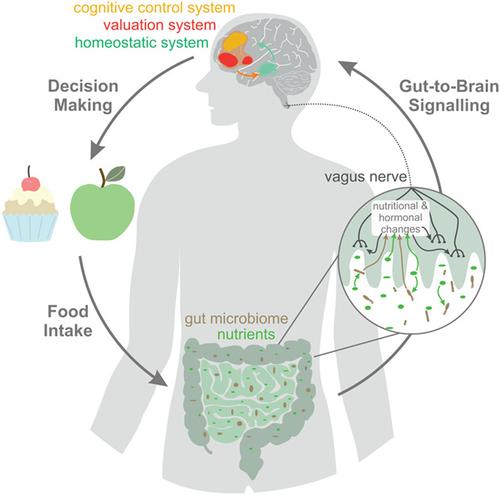当前位置:
X-MOL 学术
›
WIREs Cogn. Sci.
›
论文详情
Our official English website, www.x-mol.net, welcomes your
feedback! (Note: you will need to create a separate account there.)
How we decide what to eat: Toward an interdisciplinary model of gut–brain interactions
WIREs Cognitive Science ( IF 3.2 ) Pub Date : 2021-05-11 , DOI: 10.1002/wcs.1562 Hilke Plassmann 1, 2 , Daniela Stephanie Schelski 3, 4 , Marie‐Christine Simon 5 , Leonie Koban 1, 2
WIREs Cognitive Science ( IF 3.2 ) Pub Date : 2021-05-11 , DOI: 10.1002/wcs.1562 Hilke Plassmann 1, 2 , Daniela Stephanie Schelski 3, 4 , Marie‐Christine Simon 5 , Leonie Koban 1, 2
Affiliation

|
Everyday dietary decisions have important short-term and long-term consequences for health and well-being. How do we decide what to eat, and what physiological and neurobiological systems are involved in those decisions? Here, we integrate findings from thus-far separate literatures: (a) the cognitive neuroscience of dietary decision-making, and (b) growing evidence of gut–brain interactions and especially influences of the gut microbiome on diet and health outcomes. We review findings that suggest that dietary decisions and food consumption influence nutrient sensing, homeostatic signaling in the gut, and the composition of the gut microbiome. In turn, the microbiome can influence host health and behavior. Through reward signaling pathways, the microbiome could potentially affect food and drink decisions. Such bidirectional links between gut microbiome and the brain systems underlying dietary decision-making may lead to self-reinforcing feedback loops that determine long-term dietary patterns, body mass, and health outcomes.
中文翻译:

我们如何决定吃什么:迈向肠脑相互作用的跨学科模型
日常饮食决定对健康和福祉具有重要的短期和长期影响。我们如何决定吃什么,以及这些决定涉及哪些生理和神经生物学系统?在这里,我们整合了迄今为止不同文献的发现:(a) 饮食决策的认知神经科学,以及 (b) 越来越多的证据表明肠道-大脑相互作用,尤其是肠道微生物组对饮食和健康结果的影响。我们回顾了表明饮食决定和食物消耗会影响营养感知、肠道内稳态信号和肠道微生物组组成的研究结果。反过来,微生物组可以影响宿主的健康和行为。通过奖励信号通路,微生物组可能会影响饮食决策。
更新日期:2021-05-11
中文翻译:

我们如何决定吃什么:迈向肠脑相互作用的跨学科模型
日常饮食决定对健康和福祉具有重要的短期和长期影响。我们如何决定吃什么,以及这些决定涉及哪些生理和神经生物学系统?在这里,我们整合了迄今为止不同文献的发现:(a) 饮食决策的认知神经科学,以及 (b) 越来越多的证据表明肠道-大脑相互作用,尤其是肠道微生物组对饮食和健康结果的影响。我们回顾了表明饮食决定和食物消耗会影响营养感知、肠道内稳态信号和肠道微生物组组成的研究结果。反过来,微生物组可以影响宿主的健康和行为。通过奖励信号通路,微生物组可能会影响饮食决策。











































 京公网安备 11010802027423号
京公网安备 11010802027423号